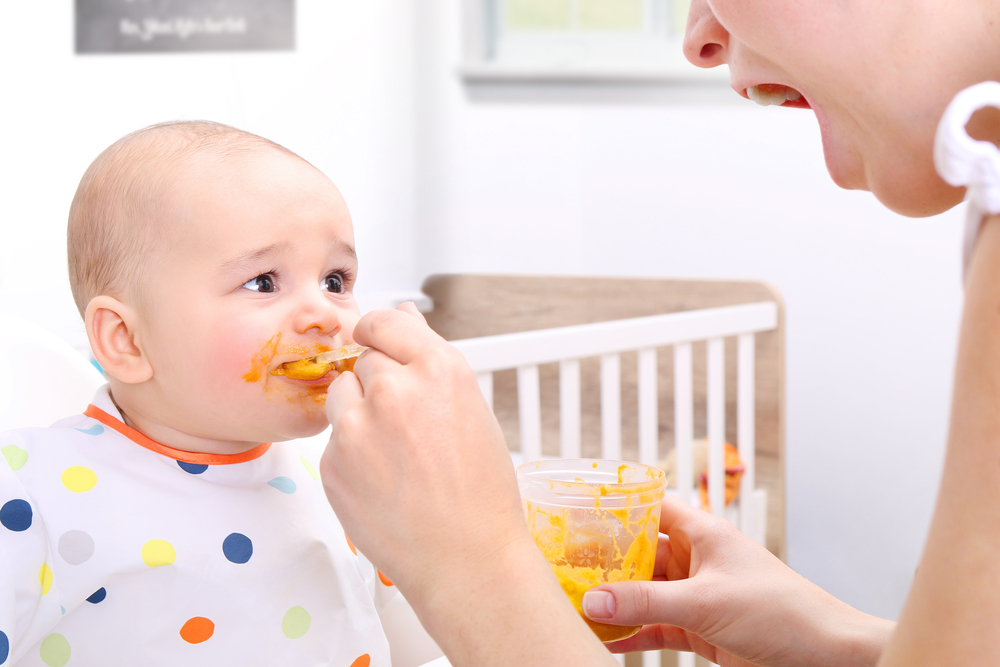Responses by: Melanie McGrice, Women and Infant Dietitian
Introducing solids to your little one is an exciting, but scary time. Your little one is growing up! Obviously, great nutrition is essential, but what else do you need to consider to ensure solids are introduced safely? Consider these 4 tips…
- Minimise choking risks – Until your baby is competent at chewing their food, it’s safest to provide them with pureed foods, or foods cut up to a size smaller than a pea. Try these tips:
- Ensure that your child sits quietly and concentrates while they eat instead of running around or lying down;
- Cook, grate or mash hard foods such as carrots and apples until your child can chew them;
- Cut grapes and cherry tomatoes into halves or quarters so that your baby doesn’t choke on the skin;
- Undertake a First Aid and CPR course so that you know how to treat your baby if they do choke.

- Be aware of food allergens – whilst recent research suggests that it is important to introduce your baby to common allergens early to build up their immune tolerance, this needs to be done in a controlled way, one allergen at a time so that you can monitor your baby for allergic reactions. Allergic reaction symptoms may include colic, eczema, skin irritation, vomiting and/or reflux. Common allergens include fish, seafood, milk, eggs, wheat, peanuts, other nuts and soy products.
Try these tips:
- When choosing baby foods, look for products which have been rigorously tested for allergens to ensure that your baby is only exposed to allergens in a safe and controlled environment;
- Allow your bub to suck a pea—sized amount of an allergen-based food i.e. peanut paste from a spoon or your finger. Many parents opt to serve peanut paste to their little one for the first time close by to a children’s hospital so that they don’t have far to travel if their baby experiences an anaphylactic reaction;
- Low sugar custards are a great way to expose your toddler to both milk and eggs before they are ready for finger foods such as frittata;
- Ensure that fish and seafood are well cooked to reduce listeria risk. You may like to start with a liquid fish oil supplement added to your baby’s puree until they are ready to try fish or seafood.
- If you suspect your baby has a food allergy, make an appointment with your pediatrician, who can refer you onto an Allergy or Immunology Medical Specialist.

- Minimise exposure to heavy metals – Heavy metals occur naturally as trace elements in the environment and certain fruits and vegetables absorb more than others, either through soil or water. High heavy metal exposure in babies and children can have impacts on their health and development, building up over time and potentially causing health conditions later in life. Developmental delays, decreased IQ scores and behavioral changes are a few examples of how high heavy metal exposure may affect the development of your child [i],[ii],[iii].
To reduce your baby’s exposure to heavy metals, try these tips:
- Replace rice cereal with infant porridge;
- Avoid giving your little one fruit juice. Instead aim for breast milk (or cow’s milk if over the age of one) and water;
- Swap teething biscuits for chilled banana or cucumber;
- Look for products that have undergone independent heavy metal testing like Little Étoile Organic baby food pouches.
- Read food labels – although we all love the idea of cooking everything from scratch, even the most organised parents appreciate the convenience of pouches for their bubba occasionally. There are a myriad of pouches available on supermarket shelves, so it’s important to read the labels to see which will be most suited to your infant.
Some key tips to look for include:
- If your baby has any food allergies, read the ingredients list carefully to look for allergens. Unfortunately ‘allergen free’ and ‘allergen friendly’ claims are regulated in Australia so look for brands that test for allergens such as Little Étoile Organic.
- Look out for additives and preservatives. Many foods contain additives and preservatives and some children can be sensitive to certain compounds. Try to limit your baby’s intake of these where possible.
- Investigate the amount of salt. High intakes of salt can be harmful to baby’s immature kidneys. Look for salt less than 120 milligrams of sodium in the per 100 grams column.
If you are looking for a baby food that considers all of these extra safety and quality measures, consider the Little Étoile Organic range, and if you have any concerns or questions about introducing solids to your little one, make an appointment to see an Accredited Practising Dietitian.
**Credits to Happy Lion Films for the photography and videography.
References:
[i] Grandjean, P., and Herz, K. Brain Development and Methylmercury: Underestimation of Neurotoxicity. Mt. Sinai. J Med. 2011; 78(1): 107–118.
[ii] Sanders A., et al. Perinatal and Childhood Exposure to Cadmium, Manganese, and Metal Mixtures and Effects on Cognition and Behavior: A Review of Recent Literature. Curr Environ Health Rep. 2015, 2(3): 284–294.
[iii] Tolins P., et al. The Developmental Neurotoxicity of Arsenic: Cognitive and Behavioral Consequences of Early
Life Exposure. Annals of Global Health 2014, 80:303-314.
You may also like to read:









